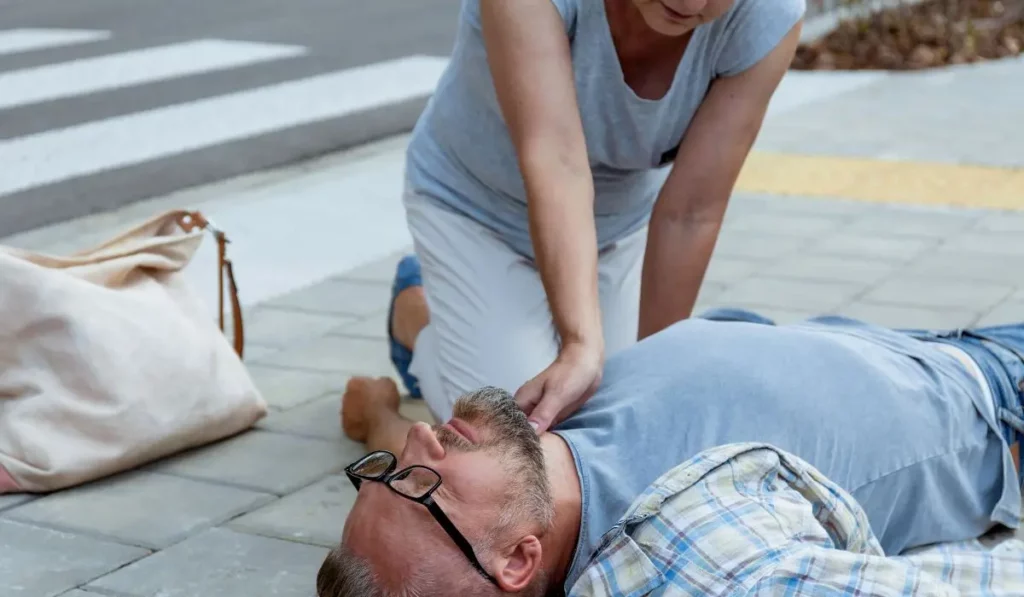Vasovagal syncope is a medical term for a common fainting episode. It is often triggered by stress or specific sights. Vasovagal syncope results from a temporary drop in blood pressure. Understanding this can help in both prevention and management. This article delves into the definition, diagnosis, and prevention of vasovagal syncope.
What Exactly Is Vasovagal Syncope?
Vasovagal syncope is defined as a momentary loss of consciousness. It happens when your blood pressure and heart rate drop suddenly, providing less blood to the brain. The body’s overreaction to specific triggers causes Vasovagal Syncope, such as:
- Witnessing blood or getting a needle prick.
- Prolonged standing.
- Emotional distress, such as receiving startling news.
- Experiencing intense pain.
- Staying in a hot and crowded environment.
“Vasovagal” comes from the vagus nerve, which controls our heart rate. If it gets too excited, our heart slows, and we might briefly black out.
The Triggers
Certain triggers can interfere with our body’s automatic controls, like heart rate. Instead of getting ready to react, the body slows down. And that’s when some people experience fainting.
How Is Vasovagal Syncope Diagnosed?
Vasovagal syncope is all about fainting, but why does it happen? To figure it out, doctors take several steps. First, they will talk with you. They will want to hear about when and how you fainted. Was it after seeing blood or standing too long?
Next, they might conduct a physical exam. Checking your heart and blood pressure can give them clues. Sometimes, they’ll ask for an ECG.

In some cases, a “tilt table test” is done. You lie on a table, and it’s tilted to imitate standing up. This test helps them see if it triggers fainting.
Lastly, blood tests can help. They check for other issues, like anemia, or dizziness.
Here are some steps to prevent Vasovagal Syncope:
👉 Stay Hydrated
Lacking water can lower your blood pressure. Aim for eight glasses a day. Hot day or big workout? You’ll need more.
👉 Conscious Posture Management
If your job or routine requires prolonged standing, take breaks. Sit down or move around. Shifting weight between feet and flexing calf muscles can promote circulation, reducing the chances of fainting.
👉 Nutrition is Essential
Blood sugar fluctuations can exacerbate vasovagal responses. Ensure you’re consuming balanced meals. If large meals make you sluggish, opt for smaller portions throughout the day.
👉 Moderate Alcohol and Caffeine Consumption
Both alcohol and excessive caffeine can interfere with your body’s hydration levels and blood pressure. Moderation is crucial. If you choose to drink, balance it with ample water intake.
👉 Dress Smartly
Tight clothing can restrict blood flow. Especially in warmer weather, opt for breathable, loose-fitting attire.
👉 Emotional Regulation and Stress Management
Chronic stress and sudden emotional shocks can trigger a vasovagal response. Techniques like deep breathing exercises, mindfulness meditation, and regular physical exercise can help manage stress.
👉 Trust Your Instincts
Often, just before a fainting episode, individuals experience warning signs — dizziness, a feeling of warmth, paleness, or nausea. If you notice these signs, it’s essential to sit or lie down immediately, preferably in a cool place.
When Should You Consult A Doctor?
A single episode of vasovagal syncope might not be alarming. However, there are scenarios when seeking medical attention becomes necessary:
- Experiencing multiple episodes in a short duration.
- Fainting without a clear trigger or during physical exertion.
- Sustaining injuries during an episode.
- If there’s a history of heart conditions in the family.
Read More:- Understanding Nephrotic Syndrome Symptoms & Treatment
Quick Facts On Vasovagal Syncope
- It’s a leading cause of fainting.
- Sometimes the brain lacks blood because the blood vessels might be too relaxed. Or the heart’s pace slows down.
- Reduce risks by avoiding long-standing sessions and very warm areas.
- Feeling dizzy or sweaty? Lie down quickly and lift your legs.
- Drinking more fluids and a bit of extra salt can help.
- For some, medications or even a pacemaker might be needed.
In summary, understanding vasovagal syncope is the first step in its prevention. By staying informed, practicing self-awareness, and taking preventive measures, you can navigate life more confidently and securely. While occasional fainting might not cause alarm, consult a healthcare professional to rule out any underlying issues.